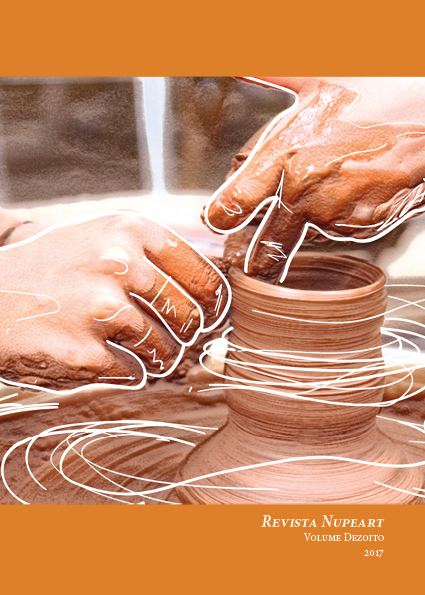NAKED RAKU RESEARCHES
DOI:
https://doi.org/10.5965/2358092518182017139Keywords:
ceramic , Raku , surface whithout glaze , slip , Naked RakuAbstract
Raku has been one of the favourite firing techniques since it allows low-firing and offers a wide range of colour options on glaze. Ceramicists’ researches in an effort to create different and alluring surfaces on a ceramic body have led to the enrichment of this technique with some variations. As a result of this quest, ceramic artists began experimenting with decorative effects on a ceramic body without using glaze in 1980s. Raku firing technique without using glaze, called Naked Raku in foreign sources, has twobasictypes, one-step nakedrakuandtwo-step nakedraku. Inone step nakedrakutechnique a thick slip is appliedtobisquefiredceramicpiecesand it is firedwhile it is wetandthenreduced. In two step nake drakuthin/ thick slip is applied and covered withlow- fire glazeandreduced. The aim of this study is to examine the development process of naked raku and giving examples from artist’s own experiences. The study includes today’s raku production process, the characteristics of clay, slip and glaze used in this process, and the firing technique.
Downloads
References
ÇİZER, Sevim; Terra Sigillata, Birinci Basım, Tibyan Yayıncılık Basım Yayım Matbaacılık San. Tic. Ltd. Şti.,Şubat 2014,İzmir
LAZO, Eduardo, Editor, Steven Branfman, Kate andWillJacobson, WallyAsselberghs, Lindaand Charlie Riggs, Amber Aquirre, Dana Bilello- Barrow, David Lazo, Contributors; Naked Raku and Related Bare Clay Techniques, TheAmericanCeramicSociety, USA, 2012
ŞÖLENAY, Emel; Seramik Sanat Eğitiminde Sırlama ve Pişirme Yöntemleri El Kitabı, Murat Kitabevi,2000, İstanbul
KOÇAK, Şirin; “Sırsız Raku Araştırma ve Uygulamaları” ( Naked Raku Researches and Applications) , Yayımlanmamış Sanatta Yeterlik Eseri Çalışması Raporu, Dokuz Eylül Üniversitesi Güzel Sanatlar Enstitüsü Seramik ve Cam Ana Sanat Dalı, İzmir, 2014
Downloads
Published
How to Cite
Issue
Section
License
Copyright (c) 2018 Revista NUPEART

This work is licensed under a Creative Commons Attribution 4.0 International License.
Os autores cedem os direitos sobre suas obras a Revista NUPEART para a publicação dos originais baixo uma licença Creative Commons Atribuição 4.0 Internacional.
Esta revista, seguindo as recomendações do movimento de Acesso Aberto, proporciona acesso público a todo seu conteúdo, seguindo o princípio de que tornar gratuito o acesso a pesquisas gera um maior intercâmbio global de conhecimento.

